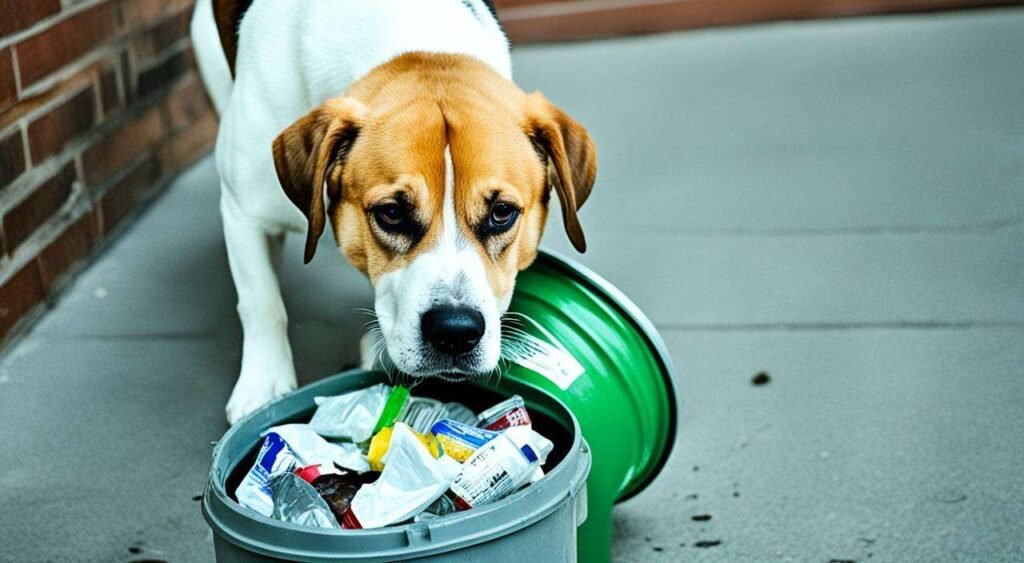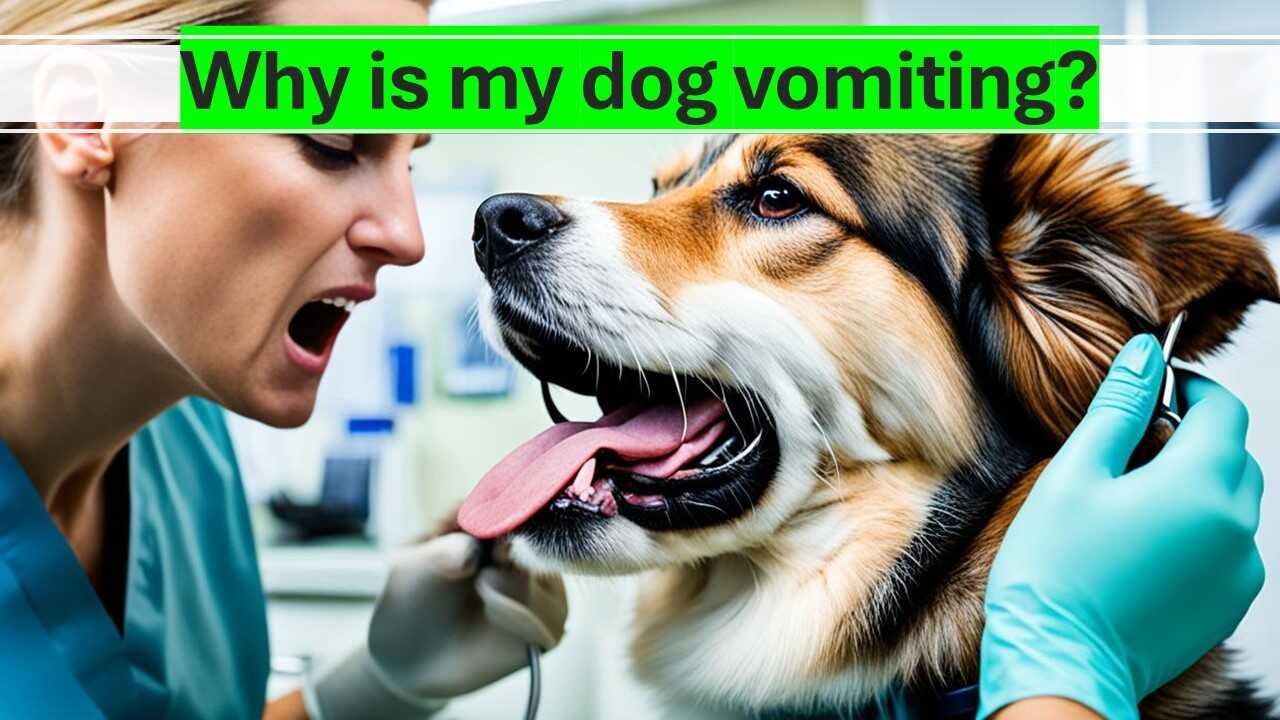Welcome to our guide on why dogs vomit. We’ll look at why this happens, what could be the cause, and ways to help your beloved pet. It’s key for dog owners to know why their pet is vomiting.
It’s common for dogs to vomit and can occur for many reasons. There are several common causes:
- Dietary indiscretion, such as eating something they shouldn’t
- Sudden diet changes or food sensitivities/allergies
- Intestinal parasites or infections
- Kidney or liver issues
- Pancreatitis
- Toxic substances ingestion
Finding the cause of your dog’s vomiting is important. Knowing why they’re unwell helps you and the vet choose the right treatment.
Key Takeaways:
- Dog vomiting has many causes, like eating the wrong thing and infections.
- It’s vital to know the root cause for the best treatment.
- Always see a vet if your dog vomits a lot or shows other worrying signs.
- Tests might be needed to learn what’s causing the vomiting.
- A healthy diet and keeping harmful things away can lower the vomiting risk.
Common Symptoms of Dog Vomiting
If your dog is vomiting, watch for other signs. These can show a more serious problem. Knowing these warning signs can help you act fast for your pet.
Typical symptoms of vomiting in dogs are:
- Abdominal pain: Look for tenderness or discomfort in the belly area.
- Weakness: Notice if your dog is lazy or has no energy.
- Vomiting with blood: Check the vomit for any blood.
- Depression: Observe if your dog seems down or not interested in usual fun activities.
- Weight loss: Keep an eye out for any sudden drops in weight.
- Dehydration: Look for signs like too much drinking or dry gums.
- Fever: Watch for a higher-than-normal body temperature.
It’s key to act quickly if your dog shows these symptoms. Contact your vet for help. This step can help rule out severe conditions and make sure your dog gets the right treatment.
Understanding the Difference between Vomiting and Regurgitation
It’s crucial to notice the difference between vomiting and regurgitation in dogs. Both are signs that something could be wrong. Knowing this helps your vet figure out what’s going on and how to treat it.
Vomiting is when a dog throws up their stomach or upper intestine’s contents. This can be violent, with the dog heaving their abdomen. It’s caused by many things, like eating something bad or an illness. Vomit often shows partially digested food, which might include yellow bile.
Regurgitation is different. It’s when food comes back up without effort, not due to sickness. This usually happens because something is blocking food from easily getting to the stomach. So, what’s regurgitated looks the same as it was when eaten and doesn’t include bile.
| Vomiting | Regurgitation |
|---|---|
| Forceful expulsion of stomach or upper intestinal contents | Passive process, food brought up without abdominal contractions |
| Partially digested material, may contain bile | Undigested food |
Figuring out if your dog is vomiting or regurgitating helps your vet a lot. It narrows down what could be wrong. If your dog shows these signs, keep track of how often it happens and what the vomit or regurgitated material looks like. This information will be very helpful for the vet.
When to Seek Veterinary Help for Dog Vomiting
It’s key to know when your dog’s vomiting needs a vet’s attention. Sometimes, vomiting now and then is alright. Yet, if it’s happening a lot or is very bad, your dog might have a health problem.
Symptoms of dog vomiting
If your dog throws up and shows these signs, call your vet:
- Frequent or constant vomiting shows a more serious issue.
- More than one vomit in a day without a break is concerning.
- For over 24 hours, seek help as soon as you can.
- Very young or old dogs may need quick medical care if they vomit.
- Dogs with health issues should see a vet to check if vomiting is serious.
Even though not all vomiting needs quick vet care, keep an eye on it. Some causes are diet changes or stress. But watching how often and how bad the vomiting is important. When in doubt, talking to a vet is better than waiting.
Spotting symptoms early and getting help fast can help avoid more problems. Your vet will check your dog’s health and run tests. They’ll also help figure out how to stop the vomiting.
Diagnosing and Treating Dog Vomiting

When your dog vomits, finding out why is key to proper care. A vet will look closely at your dog. They check everything from their eyes to their tail.
If more info is needed, tests like blood work and X-rays may be done. This helps find issues like infections or blockages. It’s all to make your furry friend feel better.
For less serious vomit cases, medicines can help. They cut down on how much your dog throws up. Infections may need antibiotics to get better.
Surgery might be needed in tough cases, like if something’s stuck. And if vomiting makes your dog dehydrated, they might need fluids. This gets them back to feeling strong.
Sometimes, what your dog eats can help with the throwing up. Your vet could suggest a special meal. Or simple foods like chicken and rice might do the trick.
Listen to your vet closely. They’ll guide you in helping your dog get well. This means less throwing up and more tail wagging.
| Treatment for Dog Vomiting | Details |
|---|---|
| Medications | Prescribed to control vomiting and alleviate discomfort |
| Fluid Therapy | Administered to restore hydration and maintain overall health |
| Antibiotics | Prescribed to address infections causing the vomiting |
| Surgery | Performed to remove foreign objects or correct structural abnormalities |
| Dietary Changes | Specialized hypoallergenic or easily digestible diet recommended for soothing the stomach |
Preventing Future Episodes of Dog Vomiting
To keep your dog healthy and stop them from vomiting, you should follow a few steps. It’s important to watch what they eat and their surroundings. Make sure your vet is part of the plan. They will help you pick the right food and keep your dog feeling their best.
Eating a Balanced Diet
Keeping your dog on a healthy diet helps their body work well. Use food that’s good for them to avoid tummy troubles. Always check with your vet. They’ll guide you on the perfect eating plan for your dog.
Avoiding Sudden Diet Changes
Changing your dog’s food quickly can upset their stomach. Switch to new food slowly over about a week. Mixing a little new food in each day helps your dog’s tummy get used to it.
Securing the Environment
Dogs like to chew on things and explore. But, they might eat something bad for them by mistake. Make sure your home is safe for your pet. Keep dangerous items away and clean up trash.
Providing a Calm and Stress-Free Environment
Stress can make a dog vomit. Keep your dog happy by giving them their own quiet spot. Stick to daily routines and make time for play and cuddles. This will help your dog stay relaxed and healthy.
Home Remedies for Dog Vomiting
If your dog gets a bit sick and vomits now and then, some home tricks can help. Your vet might tell you to feed them soft, easy-to-digest foods. Always check with your vet before trying anything new.
A calm and stress-free environment can help prevent future episodes of dog vomiting.
| Preventive Measures | Description |
|---|---|
| Eating a Balanced Diet | Feeding your dog a balanced diet to promote overall health and a well-functioning digestive system. |
| Avoiding Sudden Diet Changes | Gradually transitioning your dog to a new food to prevent digestive disturbances and vomiting. |
| Securing the Environment | Ensuring your home is free from toxic substances and objects that can cause vomiting if ingested. |
| Providing a Calm and Stress-Free Environment | Creating a peaceful environment to reduce stress and anxiety, which can contribute to vomiting. |
| Home Remedies for Dog Vomiting | Consulting with your vet for safe and effective home remedies to manage occasional vomiting in your dog. |
Using these steps and your vet’s advice will help keep your dog from getting sick. It will make your dog’s life happier and healthier.
Conclusion
It’s key to understand why your dog throws up. This helps keep them healthy and happy. Sometimes, vomiting is common, but it can also show your dog has health problems. By seeing the vet when needed, and then following their advice, you can help stop this.
If your dog is throwing up, talking to your vet is very important. They will figure out what’s wrong and make a plan just for your dog. Causes of vomiting can be eating something bad, infections, or even serious health issues. Your vet knows how to help.
Stopping your dog from throwing up again is the goal. Do this by giving them good food and avoiding bad things they might eat. Keeping their living space calm helps too. Your vet can suggest feeding them easy-on-the-stomach foods if they’re sensitive.
To wrap things up, knowing about dog vomiting is the first step. After that, working with your vet, sticking to their advice, and being proactive keeps your dog healthy and joyful. Always remember, your vet is there to help care for your furry friend.
FAQ
Why is my dog vomiting?
Dogs vomit for several reasons. This includes eating something bad, sudden diet changes, and food allergies. They might also vomit if they have internal parasites or infections. Kidney or liver issues, pancreatitis, and even eating toxic things can cause vomiting.
What are the symptoms of dog vomiting?
The signs of dog vomiting are clear. They may have belly pain, be weak, or vomit blood. Your dog could act sad, lose weight, or be very thirsty. Sometimes, they might have a fever too.
What is the difference between vomiting and regurgitation in dogs?
Vomiting is pretty active. It’s when the dog’s body forces stomach contents out, often with a lot of effort. On the other hand, regurgitation is more calm. It’s like food just comes back up without the dog trying.
When should I seek veterinary help for dog vomiting?
If your dog is throwing up a lot, it’s time to visit the vet. This includes vomiting several times in a day or nonstop, or vomiting for more than a day. Young or old dogs, or those with health issues, need extra care and should see a vet sooner.
How is dog vomiting diagnosed and treated?
Your vet will likely check your dog’s health and run some tests. This could involve blood or poop tests, as well as X-rays or ultrasounds. Treatment will depend on what’s causing the vomiting. It might involve medicine, fluids, or even surgery in severe cases.
How can I prevent future episodes of dog vomiting?
To avoid more vomiting, feed your dog well and don’t change their diet too quickly. Keep toxic things and random stuff they could swallow away from them. A peaceful, stress-free home can also make a big difference. Always check with your vet for more advice.
What are the key takeaways about dog vomiting?
Knowing why your dog is vomiting, the signs, and how it’s treated is crucial. Quick help from the vet, following their advice, and keeping your dog safe and happy are key. This can protect your dog’s health and ward off serious issues.









Leave a Reply